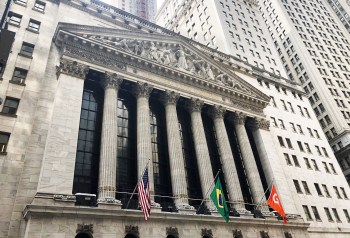
The “wealth effect” could affect consumer behavior — and U.S. politics
The “wealth effect” could affect consumer behavior — and U.S. politics

Take a look at the stock market. After lackluster performances through most of 2022 and 2023, the Dow Jones and S&P 500 indexes started climbing steadily last fall. There has been a bit of a reversal recently, with uncertainty over interest rates and rising tensions in the Middle East.
Still, the S&P 500 has risen more than 21%, as of Thursday, since the stock market rebound kicked off in late October. Additionally, home prices have soared in the pandemic era and remain near record highs.
All this leads to the “wealth effect”: people who own homes and stocks feel richer, more able to spend, because they are wealthier — at least on paper.
Bottom line: It’s a good time to be an asset owner in America.
According to the October Federal Reserve Survey of Consumer Finances, “For families that owned a home, the median net housing value (the value of a home minus home-secured debt) rose from $139,100 in 2019 to $201,000 in 2022, as home values increased and housing debt was rather flat. Net housing values grew substantially for families across the usual income distribution, reaching their highest levels on record.”
That means the typical homeowner enjoyed a 45% increase in net home value in just three years.
Evan Karr, who recently bought one home and sold another, has been riding this home-equity train.
“We just moved in about a week and a half ago,” said Karr, walking through the midcentury modern home he and his wife are renovating in a leafy, hillside suburb of Portland, Oregon. “At this point we’ve done all new hardwoods. We had to replace quite a bit of drywall, plumbing, electrical. We’re going to have countertops, which will be a lifesaver. It’s been a lot of takeout, but we have a wall oven and a microwave.”
Karr is 34 and works as a mortgage loan officer. He and his wife, who have two school-age children, paid $960,000 for their new fixer. Their previous home was in a high-demand residential neighborhood near Portland’s urban core. “We bought that at about $520,000, sold it for $860,000,” he said. “Took about four years to renovate, but we were able to gain that market appreciation.”
Israel Hill, managing principal broker at the John L. Scott real estate agency in Portland, helped the Karrs with both property sales.
“The leveraging of equity — that’s a big thing,” said Hill. “Houses took a monster jump through COVID, and people are cashing out of that equity.”
Hill said he is also seeing clients leverage gains from stock ownership to buy in or trade up. “Stock options, we see that mostly with our tech workers, cashing out options to bring their down payment,” he said.
For most middle- and upper-middle-class families, the majority of their wealth is tied up in their homes, said New York University economist Edward Wolff, who studies wealth in America. From 2007 to 2010, when home prices plummeted in the Great Recession, average household wealth fell by 44%, Wolff said, but “the good news is that it finally recovered by 2022.”
By contrast, average (or mean) wealth recovered faster, as Wolff explained: “Mean household wealth — which is heavily influenced by the wealth of the rich— also went down over the Great Recession, but not nearly as much as the median. By 2016 it was back to where it was in 2007. And since then, it’s been growing very rapidly.”
In the early years of the pandemic, soaring home prices helped drive up real (after accounting for inflation) median household wealth by an enormous 37%, according to the Fed. Wolff added that the bull market has pushed median and mean wealth up even more.
“The very wealthy — whose wealth is heavily invested in stocks — saw a good rise in their wealth,” he said.
The middle class does benefit when the stock market rises, mainly through pension accounts like IRAs and 401(k)s. According to the Fed’s Survey of Consumer Finances (Table 3, “Holding and values of assets”), 21% of families owned stocks directly in 2022, while 54% owned them indirectly through a retirement account, which could hold other financial assets along with stocks.
All this has a knock-on effect for the consumer economy.
“Consumer spending has remained very robust, in spite of everything,” Wolff said, “and part of it is the wealth effect. People’s consumption rises.”
When your home’s estimated value rises on Zillow, you feel a little richer, even if you can’t, or don’t want to, sell right now.
“People tend to extrapolate — a market that has gone up will continue to go up, so we become more positive,” said Meir Statman, who researches behavioral finance at Santa Clara University.
“If the value of the house has gone up, you might feel a bit wealthier and spend 1, 2 or 3% of this increase,” Statman said. “If that increase is from your 401(k), even though it is long-term, it feels more liquid. And you might spend a bit more than from the house.”
But while the wealth effect may be boosting consumer spending, it doesn’t seem to be doing much for consumer attitudes, said Chris Jackson at public opinion firm Ipsos.
“We’re waiting to see if the current bull market is reflected in public sentiment — ‘The economy’s back on track. Things are doing well,'” Jackson said, “or if inflation continues to keep people depressed.”
The wealth effect may also have political implications.
“A bull market — assuming it’s a sign of broader economic health — is likely to help [President Joe] Biden,” said Jackson, “because essentially it’ll take the economy off the table as one of the major issues. If we get a bear market, and that’s part of a larger economic downturn, it really hurts Biden’s chances. Because that makes the economy the clear No. 1 issue, and Trump is seen as having presided over a stronger economy.”
Equity analyst Sam Stovall at CFRA Research recently analyzed stock market performance in presidential election years since World War II. He found that in each one since 1984 when the S&P 500 rose in the three months leading up to the election, the party holding the White House won in November. When the market fell, that party lost. The pre-election percentage gain or loss in the S&P 500 ranged from less than 1% in 2000 and 2020 to more than 20% in 2008.
Princeton presidential historian Julian Zelizer said political scientists have also noted this correlation.
“Theoretically, a rising stock market should benefit the incumbent,” said Zelizer. “It’s economic news that is positive. Even if you’re not investing in the stock market, you see it on the news. It’s a kind of tell about whether a president is doing good or bad.
“So there are many reasons you’d think it would help,” Zelizer continued. “But it’s not clear that it is.”
Zelizer said he doubts it will make much difference in this year’s vote if the bull market continues into the fall. He expects that with consumer sentiment now skewing so heavily partisan, as long as Biden is in the White House, Republicans will feel more negatively, and Democrats more positively, no matter how well the economy is doing.
And he said there are other reasons the wealth effect might not hold much weight right now.
“Structural costs that Americans face, such as student debt, are much more pertinent in terms of how someone evaluates the economy than what they read about a bull market,” Zelizer said.
There’s a lot happening in the world. Through it all, Marketplace is here for you.
You rely on Marketplace to break down the world’s events and tell you how it affects you in a fact-based, approachable way. We rely on your financial support to keep making that possible.
Your donation today powers the independent journalism that you rely on. For just $5/month, you can help sustain Marketplace so we can keep reporting on the things that matter to you.

















